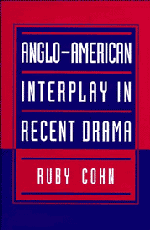6 - Englobing intimacies
Published online by Cambridge University Press: 19 March 2010
Summary
The playwrights in my final Anglo–American pair are distinctively readable as well as playable. Not only readable but well-read themselves, Christopher Hampton and Richard Nelson situate their dramas in a shrinking globe. Neither dramatist is linked with a particular style (like Bond, Pinter, and Shepard), a particular subject (like Rabe), or a particular commitment (like Hare). Crafting dialogue carefully, Hampton and Nelson have similar dramaturgical skills; on the one hand, they write witty, intimate plays in the comedy-of-manners tradition, and on the other hand, they compose larger dramas in a global context. Unspectacular, workmanlike, neither playwright has been accorded the critical attention he merits.
Christopher Hampton, born in the Azores in 1946, fell into playwriting almost by accident, whereas Richard Nelson, born in Chicago in 1950, grew up with theatre, since his mother was a dancer. Hampton has published only seven original plays, and I begin with a swift glance at his career. Born abroad to English parents, spending his childhood in Egypt, he has been something of an outsider in England where he arrived at age 10, returning overseas to visit his parents on school holidays. While a student at Oxford, where he read French and German, he wrote his first play, When Did You Last See My Mother? (1964). After a university production, it languished in the Royal Court Theatre reject pile, where it caught the eye of the neophyte director, the late Robert Kidd, who snapped it up for his first professional production – a bare-bones performance on Sunday night.
- Type
- Chapter
- Information
- Anglo-American Interplay in Recent Drama , pp. 141 - 166Publisher: Cambridge University PressPrint publication year: 1995



